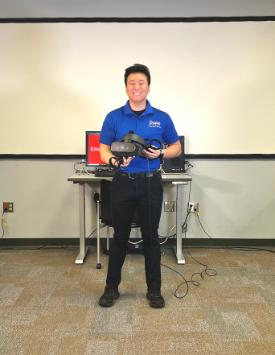Occupational Therapy Spotlight
Meet Jamie Bryan. Jamie is a third-year student in Drake's Occupational Therpay Doctorate (OTD) program and will graduate in 2022! In his last year of the OTD program, Jamie has had the opportunity to complete a doctoral capstone experience at Iowa State University's Digital Accessibility Lab in Ames, Iowa.

Tell us about your capstone experience at Iowa State University's Digital Accessibility Lab. What were your responsibilities and what did a typical day/week look like?
What is your favorite thing about this Doctoral Capstone?
My favorite thing about the Doctoral Capstone experience is getting to use VR (Oculus Rift S). I was intrigued by VR prior to starting at Drake, though I didn’t know how feasible it would be. I also appreciate that I was able to find a patient to work with. By mid-March, I wasn’t sure if I was going to find anyone to work with.
What attracted you to Drake's OTD program?
I felt like I really connected well with the faculty/staff during the interview process and it helped calm my nerves. Drake seemed like a good fit for myself and my goals and I also liked the city of Des Moines when I visited. I have made so many incredible friends/connections through Drake and the Fieldwork experiences I went on. I also had the opportunity to present at a couple of conferences and participate in a leadership development series.
Have your career goals changed at all since starting Drake's OTD program? How so?
Not really. When I first came to Drake, I wasn’t sure what kind of area I wanted to work in. I decided to keep an open mind about different practice areas even if I wasn’t quite interested in them. I’m still not entirely sure what practice area I want to start in, but I’m confident I will be able to find something in the near future.
How has Drake prepared you for your future career as an occupational therapy professional?
Drake has provided me with resources and materials to continue to learn well past graduation. The didactic coursework helped me learn clinical skills that could be utilized and enhanced through fieldwork experiences. Occupational therapy is a profession of lifelong learning and I’m excited to continue to learn throughout the course of my professional career.
What is one piece of advice you'd give to future occupational therapy students?
Keep the end goal in mind. There will be days when you doubt yourself and your abilities and wonder if you made the right choice. It is imperative to find the positives in negative situations whenever possible. Setbacks are inevitable but manageable. Try to keep moving forward while progressing as a student and future practitioner. Additionally, try to find a balance in life between studying, work, and leisure activities. To avoid the feeling of burnout, occupational therapy students should not dedicate too much of their time to any of these three occupations. Studying is essential and working to earn money can be beneficial, but time should also be set aside to have fun/unwind.


